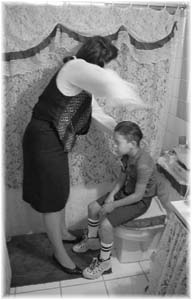![[Metroactive News&Issues]](/gifs/news468.gif)
![[Metroactive News&Issues]](/gifs/news468.gif)
[ Metro | Metroactive Central | Archives ]
Back to Work
 Up and at 'Em: Connie Chavez grooms son Gabriel before beginning her first day on the new job.
Connie Chavez's first day on the job could inspire those who fear the future in post-welfare California. She says intensive training with the federally funded GAIN program gave her a key to find the confidence and skills to get off welfare and join the work force.
Words by Traci Hukill This is Connie Chavez's moment to shine. Surrounded by a dozen GAIN workshop classmates at the Employment Services Center on North King Street in San Jose's East Side, the radiant 35-year-old mother of two recounts how she successfully negotiated with a prospective employer for more money. "The woman called and offered me a job doing clerical work for $8.50 an hour," she gushes, her words spilling over one another in her excitement. "I told her, 'I'd really like to work for you, but if you can negotiate it so I can make $9...' She said, 'I'll see what I can do,' and called me back 10 minutes later and offered me the job--for $9 an hour!" Murmurs of awe and approval give way to applause and noisy congratulations from Chavez's workshop leaders and fellow attendees. But expressions around the horseshoe-shaped ring of tables are mixed: Some women look delighted, as if they've just realized for the first time that it really is possible to get a job beyond the French-fry maker or the assembly line, while others look vaguely depressed, discouraged after weeks of fruitless phone calls, and perhaps a little dismayed at the apparent ease with which the attractive and outspoken Chavez has found work.
Chavez herself glows with elation, relief and the sudden magnanimity of success. When the congratulations are over, she parks herself at a table and starts filling out an exit sheet, stopping intermittently to chatter encouragement to other women sitting nearby. But although Chavez is gracious about her moment in the sun, she also credits herself for having the foresight to take advantage of the GAIN program now, before widespread panic over reformed welfare limits hits, and she urges other people to do the same. "I knew I'd better utilize these services because next year there's going to be such a long wait for GAIN," she says. "People with four or five children who didn't come here are going to be between a rock and a hard place." GAIN, which stands for Greater Avenues to Independence, is an adjunct program to AFDC, or Aid to Families with Dependent Children (what most people think of as "welfare" and will soon be called TANF--Temporary Assistance to Needy Families). Any adult--as long as his or her youngest child is more than 3 years old--who receives AFDC is also automatically placed on a waiting list for a GAIN job-search workshop, in which people learn résumé writing and interviewing skills. After the GAIN workshop, which usually lasts about a week, a structured job search lasting several weeks follows, during which participants actively pursue employment using the computers, telephones and personal guidance available at GAIN centers.
Chavez hasn't worked since a knee injury seven years ago. But she swallowed her pride and signed up for welfare this past January, four months after her monthly comp checks of $668 ceased. From the start she knew about the new time limit on welfare, but says she already thought of welfare as temporary. "I was well aware of [the new limit], but I had no intention of staying on it that long," she insists. "Welfare was just temporary for me." Before this round of assistance, though, Chavez spent 13 years on welfare as she struggled to raise a little boy she had at the age of 15. It was the natural thing to do--her mother had gone on welfare years earlier as she attempted to raise five young children on a single income. "Then she started working two jobs, went to college, and got her associate degree," Chavez recalls. "I had to cook, clean, get three brothers and a sister off to school. Then when I was done, I'd work at the QuikMart sweeping the parking lot for $3 an hour to help my mom."
Chavez's first son, Daniel, is now a 20-year-old student at San Jose City College. Her youngest, Gabriel, is 6. Now that Chavez is employed, Gabriel will be in day care after school--most likely subsidized by the state under the auspices of a program called Temporary Child Care. Maybe because she can now afford to, bolstered as she's been by three separate job offers today, Chavez speaks positively about welfare reform. "I think it's good. I hope it works out OK for everyone," she says earnestly. "But all these options are given to people, and if they don't use them, they're gonna be struggling to even get a $5.50-an-hour job. "It's not fair to the next generation," she continues. "The only way they'll learn is for me to have a success story to give them." Tomorrow morning at 8 o'clock Chavez starts work at 20th Century Spring Manufacturing. It's hard to say why her GAIN experience has been so textbook-perfect, while many of her classmates struggle to even get an interview, and countless welfare recipients across the nation languish in the hopelessness of their own situations. Maybe her mother's example inspired her. Or maybe Chavez, who smells like flowers today and flashes a generous smile each time she speaks, was ripe for change and eager to start writing the first lines of a success story. [ Metro | Metroactive Central | Archives ]
| ||||||||||||||||||||||||||||||
Copyright © Metro Publishing Inc. Maintained by Boulevards New Media.